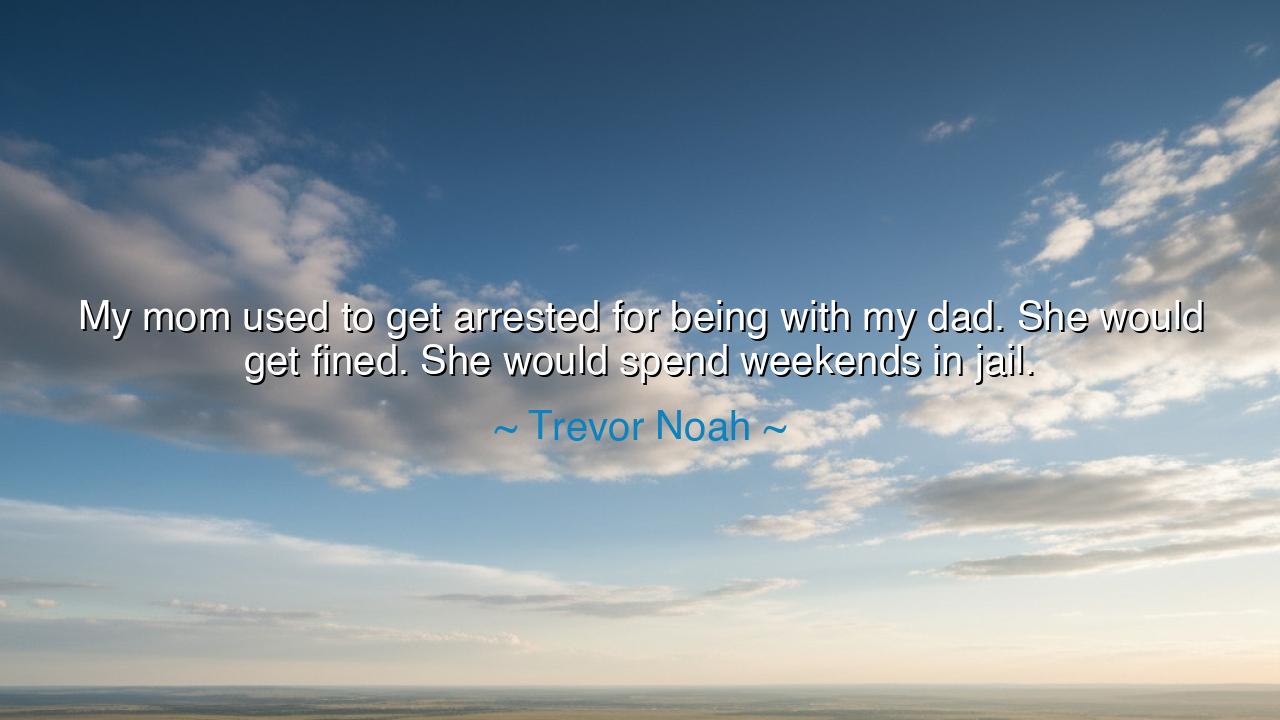
My mom used to get arrested for being with my dad. She would get
My mom used to get arrested for being with my dad. She would get fined. She would spend weekends in jail.






“My mom used to get arrested for being with my dad. She would get fined. She would spend weekends in jail.” — Trevor Noah.
Thus spoke Trevor Noah, the storyteller of South Africa, whose laughter hides the weight of history. In these few, simple words lies a truth as deep as the roots of suffering — a memory not only of his family’s pain, but of a world divided by cruelty and ignorance. His mother’s crime was love, her rebellion was existence, and her punishment was freedom’s price. What she endured was not an act of personal defiance alone, but the echo of countless hearts that dared to love across the walls that men built between them.
The origin of this quote arises from Trevor Noah’s memoir, Born a Crime, in which he tells the story of growing up under apartheid, the system of racial segregation that governed South Africa for nearly half a century. His mother, Patricia Nombuyiselo Noah, a Black Xhosa woman, fell in love with his father, Robert Noah, a white Swiss man — a love that was literally illegal under apartheid law. Their relationship violated the Immorality Act, which forbade interracial unions. For this act of the heart, she faced arrest, fines, and imprisonment. Yet she continued. She walked through the streets with quiet courage, carrying in her womb a child who, under the law, should never have existed. Trevor Noah himself was that living act of defiance — the child of a forbidden love, the embodiment of hope born from injustice.
Her story recalls the eternal conflict between law and conscience, between the decrees of men and the higher law of the soul. The rulers of that land could outlaw touch, companionship, and marriage — but they could not outlaw humanity. Like the ancients who stood before kings and said, “There is a law above your law,” Trevor’s mother chose love over fear. She did not raise her fist in rebellion; she simply refused to let her heart be conquered. Her weekends in jail were not signs of weakness, but marks of sacred defiance. For every night she spent behind bars, the world grew a little closer to waking.
There have always been such women in the chronicles of time — quiet pillars of courage who stood against injustice with the gentleness of truth. Think of Rosa Parks, who refused to move from her seat, and in doing so, moved the conscience of a nation. Think of Sophia Magdalena Scholl, the young student who dared to speak against tyranny in Nazi Germany and paid with her life. Like them, Trevor Noah’s mother was not a warrior of the sword, but of the spirit. Her battle was not fought on battlefields, but in the ordinary acts of living with dignity amid oppression. Her strength was the strength of all mothers who have ever looked at a cruel world and said, “My child will be free.”
In this way, Trevor’s words do not merely honor his mother’s endurance; they reveal a profound truth about love as resistance. In a world divided by fear and prejudice, love becomes an act of rebellion. It is the flame that refuses to be extinguished, even when surrounded by walls of hate. To love when it is forbidden is to proclaim that the human heart belongs not to governments, nor to race, nor to law — but to itself. His mother’s love was revolutionary not because it sought to overthrow power, but because it refused to submit to inhumanity.
And yet, there is also sorrow in his words — a sorrow that speaks for generations who have known what it is to be criminalized for their existence. For Trevor, to say “my mom used to get arrested for being with my dad” is to remember that his very birth was an act of danger. It is to carry within him both the burden and the beauty of their courage. The laughter that fills his comedy today is not the laughter of forgetting, but the laughter of survival — the ancient laughter of those who endure and rise. His life itself is a monument to his mother’s faith: that even in chains, the heart can remain free.
So let this be the lesson carried forward: Do not fear to love what the world forbids. When injustice builds its walls, love is the hammer that cracks them. When hatred writes its laws, compassion rewrites them in the hearts of men. Like Trevor Noah’s mother, be steadfast in conscience, unyielding in tenderness, and bold in truth. There will be days when your goodness is punished, when your light is misunderstood — but remember that every act of love, no matter how small, reshapes the world’s foundation.
For in the end, her story — and his — teach us this timeless truth: the power of love is greater than the power of law. It endures prison, scorn, and separation, yet it never dies. The greatest revolutions begin not in riots or armies, but in hearts that refuse to bow before injustice. So when the world tells you that your love, your compassion, or your humanity is a crime — love anyway. For love, as Trevor Noah’s mother showed us, is not just affection; it is the oldest and noblest act of freedom.






AAdministratorAdministrator
Welcome, honored guests. Please leave a comment, we will respond soon